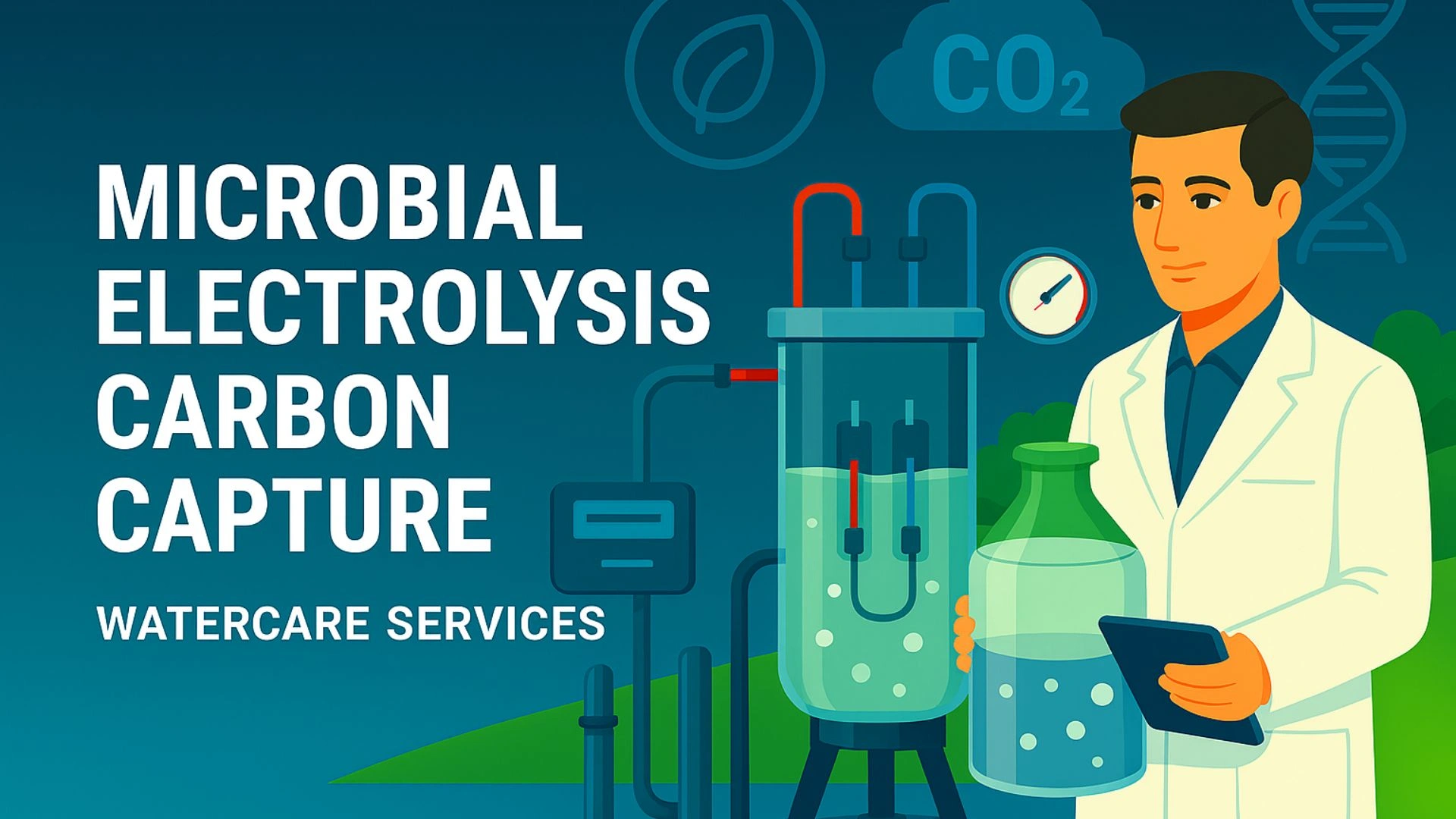In the search for sustainable, renewable energy solutions and effective wastewater treatment, Microbial Electrolysis Carbon Capture (MECC) technology is emerging as a game-changer. This advanced process uses bacteria to convert organic material in wastewater into valuable products, such as hydrogen, while simultaneously capturing carbon dioxide (CO2) to reduce greenhouse gas emissions. By combining the benefits of microbial fuel cells, wastewater energy recovery, and carbon capture, MECC represents a new frontier in wastewater treatment that is not only environmentally friendly but also energy-efficient.
But how exactly does this technology work, and why is it causing such a buzz in the world of sustainable wastewater management? Let’s dive into the mechanics of MECC and its potential to revolutionize the wastewater treatment industry.
How Does Microbial Electrolysis Carbon Capture (MECC) Work?
What Are the Key Processes Behind MECC Technology?
The Microbial Electrolysis Carbon Capture (MECC) process involves the integration of microbial fuel cells (MFCs) and electrolysis to generate hydrogen from wastewater while simultaneously capturing carbon. This process involves three main steps:
- Microbial Fuel Cells (MFCs):
At the heart of MECC technology are microbial fuel cells. These cells harness the power of naturally occurring bacteria to break down organic matter in wastewater. The bacteria consume the organic material and, during this process, release electrons and protons. These electrons are captured through an electrode in the system and directed towards an external circuit, creating an electric current. This is essentially a natural energy generation process driven by microorganisms. - Electrolysis and Hydrogen Production:
The electric current generated by the microbial fuel cells is used to drive electrolysis, a process that splits water molecules (H2O) into hydrogen gas (H2) and oxygen (O2). The hydrogen produced here can be utilized as a clean, renewable fuel source. By using wastewater as a substrate, MECC technology not only generates hydrogen but also taps into an often-overlooked energy resource, making wastewater treatment plants energy-positive instead of energy-negative. - Carbon Capture:
One of the most innovative aspects of MECC is its ability to capture and reduce carbon emissions. The CO2 that is produced as a byproduct of microbial metabolism is captured in the system and can be utilized in various ways, including being converted into valuable chemicals or sequestered to prevent its release into the atmosphere. This aspect makes MECC an essential part of the fight against climate change, as it helps mitigate the impact of greenhouse gases.
Through these steps, MECC technology is creating a circular system of wastewater treatment that not only purifies water but also recovers energy and helps in carbon capture, which significantly lowers the carbon footprint of wastewater treatment facilities.
How Is MECC Technology Revolutionizing Wastewater Treatment?
What Are the Major Benefits of MECC in Wastewater Management?
The impact of MECC technology on wastewater treatment is profound. By transforming traditional treatment plants into energy-positive facilities, MECC has the potential to change the way industries approach water purification and energy recovery. Let’s take a look at some of the major benefits of MECC technology in wastewater treatment:
- Wastewater Energy Recovery:
Traditional wastewater treatment processes are energy-intensive. However, MECC systems produce hydrogen through the breakdown of organic material, making wastewater treatment plants energy-positive. This means that instead of consuming vast amounts of electricity from external sources, plants can generate their own energy from the wastewater they treat. This energy can even be used to power the treatment process itself, reducing operating costs and making facilities more efficient. - Carbon Capture and Reduced Emissions:
Carbon capture in MECC systems helps reduce the environmental impact of wastewater treatment plants. The CO2 produced during the microbial digestion process is captured rather than being released into the atmosphere. This process not only helps reduce greenhouse gas emissions but also provides an opportunity to utilize the captured carbon in other industries, such as for the production of biofuels or chemicals. - Hydrogen Production from Wastewater:
The production of hydrogen from wastewater is one of the most exciting aspects of MECC technology. Hydrogen is considered a clean fuel with a high energy yield and zero emissions when burned. By generating hydrogen as a byproduct of wastewater treatment, MECC technology can contribute to the growing hydrogen economy, providing a sustainable source of fuel that can be used for power generation, transportation, and industrial applications. - Sustainable Wastewater Treatment:
MECC technology allows for the treatment of wastewater in a sustainable and environmentally friendly manner. It reduces the need for harmful chemicals traditionally used in wastewater treatment and eliminates the release of pollutants into natural water sources. Moreover, by producing clean energy and capturing carbon, MECC aligns with global sustainability goals and regulatory requirements for cleaner industrial practices. - Cost Efficiency:
Although the initial investment in MECC technology can be high, the long-term financial benefits are significant. By generating hydrogen and reducing reliance on external energy sources, wastewater treatment plants can lower operational costs. Additionally, the possibility of utilizing carbon captured in the process adds a revenue stream, making MECC systems an attractive financial investment for businesses and municipalities alike.
Membrane BioreactorWastewater Treatment System
Wastewater Treatment System Wastewater treatment refers to the process of treating water that has been contaminated through human activities. This
How Can Industries Benefit from Hydrogen Production in Wastewater?
Why Is Hydrogen from Wastewater a Game-Changer for Industries?
The production of hydrogen from wastewater is an essential innovation brought by MECC technology. Here’s why industries are starting to take notice:
- Clean and Renewable Energy Source:
Hydrogen is considered one of the cleanest sources of energy available. When used in fuel cells, hydrogen produces only water vapor as a byproduct, making it a zero-emission fuel. By harnessing wastewater to produce hydrogen, industries can adopt a truly renewable energy source that doesn’t contribute to air pollution or greenhouse gas emissions. - Energy for Industrial Operations:
Hydrogen produced from wastewater can be used to generate electricity for various industrial operations. Whether it’s for heating, powering machines, or fueling vehicles, hydrogen offers a versatile energy solution. Companies that integrate MECC technology into their wastewater treatment processes may find themselves less reliant on fossil fuels, leading to energy independence and long-term cost savings. - Meeting Sustainability Goals:
As industries face increasing pressure to meet sustainability targets and reduce their carbon footprints, MECC provides a means to do so. By turning wastewater into a valuable resource that generates hydrogen, industries can align their operations with renewable energy goals, helping to enhance their corporate social responsibility (CSR) profiles.
What Are the Challenges in Implementing MECC Technology?
Are There Any Obstacles to Widespread Adoption of MECC Systems?
While MECC technology holds significant promise for revolutionizing wastewater treatment, there are still some challenges to overcome before it can be widely adopted:
- High Initial Investment:
The upfront costs of installing MECC systems can be significant. The equipment required for microbial fuel cells, electrolysis units, and carbon capture mechanisms can be costly, making the technology less accessible for small-scale wastewater treatment facilities. - Technology Maturity:
While MECC is a promising technology, it is still relatively new, and the systems require further research and development. Optimizing the efficiency of microbial fuel cells, improving the electrolysis process, and enhancing carbon capture capabilities are all areas that need refinement to make MECC a more reliable and scalable solution. - Operational Complexity:
MECC systems involve complex processes that require careful monitoring and management. The systems need to maintain the right conditions for bacterial growth and optimize energy recovery, which requires skilled operators and ongoing maintenance. - Carbon Utilization:
Capturing carbon is only part of the solution; the next challenge is finding sustainable ways to utilize the captured CO2. While some industries have found ways to convert carbon into valuable products, like biofuels, this aspect of MECC technology is still in the early stages and requires further innovation.
Conclusion: The Future of Wastewater Treatment with MECC Technology
Why Is MECC Technology the Future of Wastewater Treatment and Carbon Capture?
Microbial Electrolysis Carbon Capture (MECC) technology is poised to revolutionize wastewater treatment by combining renewable energy production, carbon capture, and wastewater management into a single, sustainable solution. The ability to generate hydrogen from wastewater and capture CO2 presents a unique opportunity to tackle some of the most pressing environmental challenges we face today.
As industries continue to strive for sustainability, MECC offers a promising pathway to reduce their carbon footprints, generate clean energy, and adopt more efficient wastewater management systems. The future of wastewater treatment is not only about purification but also about turning wastewater into a valuable resource, and MECC technology is leading the way.
FAQs About Microbial Electrolysis Carbon Capture (MECC) Technology
1. What is MECC technology?
MECC technology is a wastewater treatment process that combines microbial fuel cells, electrolysis, and carbon capture to generate hydrogen from wastewater while reducing greenhouse gas emissions.
2. How does MECC produce hydrogen from wastewater?
Microbial fuel cells break down organic matter in wastewater, generating an electric current that powers electrolysis, which splits water into hydrogen and oxygen.
3. Can MECC help in carbon capture?
Yes, MECC captures CO2 produced during microbial metabolism and either sequesters it or utilizes it for other processes, reducing greenhouse gas emissions.
4. What industries can benefit from MECC technology?
Industries such as wastewater treatment plants, food and beverage, pharmaceuticals, and energy can benefit from MECC’s ability to produce hydrogen and capture carbon.
5. What are the challenges of implementing MECC systems?
The main challenges include high initial investment costs, technological maturity, operational complexity, and finding sustainable ways to utilize the captured carbon.


